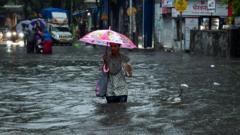The recent assessment emphasizes the need for integrated solutions to combat interconnected environmental crises facing the planet.
**Global Nature Crisis Interconnectedness Highlighted in Landmark Report**

**Global Nature Crisis Interconnectedness Highlighted in Landmark Report**
A significant report underscores the urgent links between biodiversity, climate change, and food security.
In a landmark report approved by nearly 150 nations in Windhoek, Namibia, the Intergovernmental Platform on Biodiversity and Ecosystem Services (IPBES) has warned that issues like climate change, loss of biodiversity, and food insecurity are deeply interconnected. According to the findings, treating these challenges in isolation will hinder effective solutions.
The review indicates that many governments are neglecting the interdependencies among five crucial domains: biodiversity, water, food security, human health, and climate change. This fragmented approach has led to unintended consequences, such as negatively impacting ecosystems through reforestation efforts or increasing river pollution while attempting to boost agricultural output.
IPBES co-chair Paula Harrison, a professor specializing in land and water modeling at the UK Centre for Ecology & Hydrology, highlighted the critical need to acknowledge these relationships. "Our governance frameworks often operate in silos, leading to a lack of holistic thinking," she explained. "This results in outcomes that may further worsen existing environmental crises."
The report identified over 70 low-cost strategies for addressing these intertwined issues. For instance, the study addressed bilharzia, a disease that affects over 200 million individuals, mainly in Africa. A dual approach in rural Senegal effectively tackled water pollution while also managing invasive species that facilitate the disease's transmission, yielding benefits for both public health and biodiversity.
Furthermore, the report noted that economic decision-making prioritizes immediate financial benefits without considering the ecological costs. Co-chair Pamela McElwee from Rutgers University revealed that the unaddressed expenses tied to current economic practices, which affect biodiversity and ecosystems, are estimated to range from $10 trillion to $25 trillion annually.
Globally, over half the population, particularly in developing regions, resides in areas experiencing severe declines in biodiversity, water quality, and food security. The report issued a stark warning that delaying actions to meet policy objectives will likely exacerbate the costs associated with these challenges, potentially doubling them and increasing species extinction risks.
Looking ahead, the IPBES report examined various future scenarios up to the years 2050 and 2100. It found that maintaining a "business as usual" path would lead to catastrophic outcomes for biodiversity and human health. Tackling one issue without addressing others could inadvertently create additional challenges, such as prioritizing climate change initiatives that may harm biodiversity and food production due to land competition.
However, the report does present hopeful possibilities. Scenarios emphasizing sustainable production, ecosystem restoration, pollution reduction, and climate adaptation reveal the potential for synergistic benefits across various sectors. These integrated approaches offer viable paths toward a healthier planet.
IPBES, often likened to the climate-focused Intergovernmental Panel on Climate Change (IPCC), aims to guide policymakers by delivering scientific assessments on biodiversity and ecosystem services, reinforcing the urgent call to recognize nature's true value. Following previous reports that warned against the perils of undervaluing nature and the impending risk of mass extinction, the IPBES continues to advocate for proactive conservation efforts worldwide.
The review indicates that many governments are neglecting the interdependencies among five crucial domains: biodiversity, water, food security, human health, and climate change. This fragmented approach has led to unintended consequences, such as negatively impacting ecosystems through reforestation efforts or increasing river pollution while attempting to boost agricultural output.
IPBES co-chair Paula Harrison, a professor specializing in land and water modeling at the UK Centre for Ecology & Hydrology, highlighted the critical need to acknowledge these relationships. "Our governance frameworks often operate in silos, leading to a lack of holistic thinking," she explained. "This results in outcomes that may further worsen existing environmental crises."
The report identified over 70 low-cost strategies for addressing these intertwined issues. For instance, the study addressed bilharzia, a disease that affects over 200 million individuals, mainly in Africa. A dual approach in rural Senegal effectively tackled water pollution while also managing invasive species that facilitate the disease's transmission, yielding benefits for both public health and biodiversity.
Furthermore, the report noted that economic decision-making prioritizes immediate financial benefits without considering the ecological costs. Co-chair Pamela McElwee from Rutgers University revealed that the unaddressed expenses tied to current economic practices, which affect biodiversity and ecosystems, are estimated to range from $10 trillion to $25 trillion annually.
Globally, over half the population, particularly in developing regions, resides in areas experiencing severe declines in biodiversity, water quality, and food security. The report issued a stark warning that delaying actions to meet policy objectives will likely exacerbate the costs associated with these challenges, potentially doubling them and increasing species extinction risks.
Looking ahead, the IPBES report examined various future scenarios up to the years 2050 and 2100. It found that maintaining a "business as usual" path would lead to catastrophic outcomes for biodiversity and human health. Tackling one issue without addressing others could inadvertently create additional challenges, such as prioritizing climate change initiatives that may harm biodiversity and food production due to land competition.
However, the report does present hopeful possibilities. Scenarios emphasizing sustainable production, ecosystem restoration, pollution reduction, and climate adaptation reveal the potential for synergistic benefits across various sectors. These integrated approaches offer viable paths toward a healthier planet.
IPBES, often likened to the climate-focused Intergovernmental Panel on Climate Change (IPCC), aims to guide policymakers by delivering scientific assessments on biodiversity and ecosystem services, reinforcing the urgent call to recognize nature's true value. Following previous reports that warned against the perils of undervaluing nature and the impending risk of mass extinction, the IPBES continues to advocate for proactive conservation efforts worldwide.























